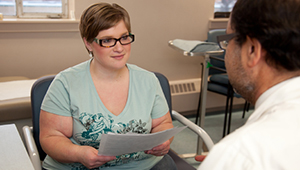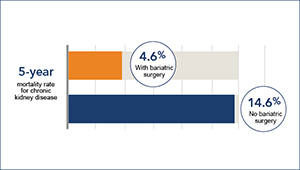Obesity
Research overview
“Obesity is the number-one health problem in the United States because it negatively affects our population’s health more than any other condition,” said Kaiser Permanente Washington Health Research Institute Senior Investigator David Arterburn, MD, MPH. Kaiser Permanente Washington researchers are doing practical research to learn how doctors, patients, families, employers, and policymakers can best work together to prevent and treat obesity.
“We’re focusing on three ways to halt the obesity epidemic,” said Senior Investigator Dori Rosenberg, PhD, MPH. “We’re helping to change obesity-promoting environments, bringing evidence-based prevention and treatment programs into health care systems, and helping people develop lifelong healthy diet and activity habits.”
Kaiser Permanente Washington obesity research areas include:
- reducing sedentary behavior and promoting physical activity and healthy diet in various age groups, populations with chronic conditions, and families;
- shared decision making to help patients find the best way to a healthy weight;
- implementing health coaches in primary care to support behavior changes;
- social networks that support lifestyle change programs;
- relationships between medications and genetic factors in developing obesity;
- health system, community, and national policies that address obesity;
- relationships between obesity and depression, diabetes, and other conditions; and
- long-term benefits and risks of bariatric (weight loss) surgery.
“Obesity is caused by many factors, so at Kaiser Permanente Washington, we’re working on many levels,” said Paula Lozano, MD, MPH, a senior investigator and Kaiser Permanente Washington’s assistant medical director for preventive care. “We’re improving health care to help people who are obese now. But since obesity is a societal problem, we’re also studying how to change our homes and workplaces and neighborhoods to create more healthy environments.”
Recent publications on Obesity
Arterburn D, Westbrook EO, Terrell A. Weight control practices of severely obese patients who are not seeking bariatric surgery. Obesity (Silver Spring). 2013 Aug;21(8):1509-13. doi: 10.1002/oby.20488. Epub 2013 Jul 5. PubMed
Liu CT, Monda KL, Taylor KC, Lange L, Demerath EW, Palmas W, Wojczynski MK, Ellis JC, Vitolins MZ, Liu S, Papanicolaou GJ, Irvin MR, Xue L, Griffin PJ, Nalls MA, Adeyemo A, Liu J, Li G, Ruiz-Narvaez EA, Chen WM, Chen F, Henderson BE, Millikan RC, Ambrosone CB, Strom SS, Guo X, Andrews JS, Sun YV, Mosley TH, Yanek LR, Shriner D, Haritunians T, Rotter JI, Speliotes EK, Smith M, Rosenberg L, Mychaleckyj J, Nayak U, Spruill I, Garvey WT, Pettaway C, Nyante S, Bandera EV, Britton AF, Zonderman AB, Rasmussen-Torvik LJ, Chen YD, Ding J, Lohman K, Kritchevsky SB, Zhao W, Peyser PA, Kardia SL, Kabagambe E, Broeckel U, Chen G, Zhou J, Wassertheil-Smoller S, Neuhouser ML, Rampersaud E, Psaty B, Kooperberg C, Manson JE, Kuller LH, Ochs-Balcom HM, Johnson KC, Sucheston L, Ordovas JM, Palmer JR, Haiman CA, McKnight B, Howard BV, Becker DM, Bielak LF, Liu Y, Allison MA, Grant SF, Burke GL, Patel SR, Schreiner PJ, Borecki IB, Evans MK, Taylor H, Sale MM, Howard V, Carlson CS, Rotimi CN, Cushman M, Harris TB, Reiner AP, Cupples LA, North KE, Fox CS. Genome-wide association of body fat distribution in African ancestry populations suggests new loci. PLoS Genet. 2013;9(8):e1003681. doi: 10.1371/journal.pgen.1003681. Epub 2013 Aug 15. PubMed
Arterburn D, Bogart A, Coleman KJ, Haneuse S, Selby J, Sherwood NE, Sidney S, Theis MK, Campos GM, McCulloch D, O'Connor P. Comparative effectiveness of bariatric surgery vs. nonsurgical treatment of type 2 diabetes among severely obese adults Obes Res Clin Pract. 2013 Jul-Aug;7(4):e235-320. doi: 10.1016/j.orcp.2012.08.196. PubMed
Grow HM, Hsu C, Liu LL, Briner L, Jessen-Fiddick T, Lozano P, Saelens BE. Understanding family motivations and barriers to participation in community-based programs for overweight youth: one program model does not fit all. J Public Health Manag Pract. 2013 Jul-Aug;19(4):E1-E10. doi: 10.1097/PHH.0b013e31825ceaf9. PubMed
Johnson DB, Cheadle A, Podrabsky M, Quinn E, MacDougall E, Cechovic K, Kovacs T, Lane C, Sitaker M, Chan N, Allen D. Advancing nutrition and obesity policy through cross-sector collaboration: The Local Farms - Healthy Kids Initiative in Washington State. J Hunger Environ Nutr. 2013;8(2):171-86. PubMed
Researchers in Obesity
 David E. Arterburn, MD, MPHSenior Investigator |
 Allen Cheadle, PhDSenior Investigator, KPWHRI; Senior Research Associate, CCHE |
 Andrea J. Cook, PhDSenior Biostatistics Investigator |
 Maricela Cruz, PhDAssociate Biostatistics Investigator |
 Nicole M. Gatto, PhD, MPHPrincipal Collaborative Scientist |
 Beverly B. Green, MD, MPHSenior Investigator |
 Mikael Anne Greenwood-Hickman, MPHSenior Collaborative Scientist |
 Paula Lozano, MD, MPHSenior Investigator; Director, ACT Center |
 Dori E. Rosenberg, PhD, MPHSenior Investigator |
 Gregory E. Simon, MD, MPHSenior Investigator |











